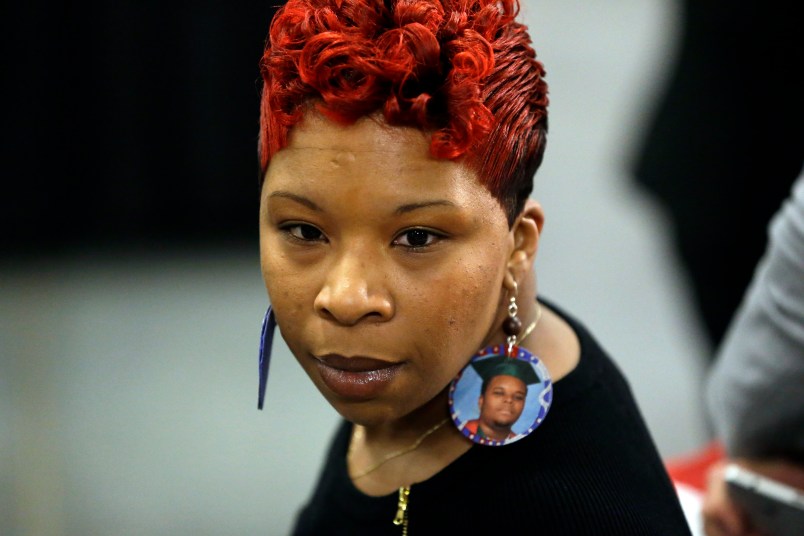FERGUSON, Mo. (AP) — Michael Brown’s mother could soon have oversight over the police department connected to her son’s death, if voters in Ferguson, Missouri, elect her to the City Council.
Lesley McSpadden, 39, is among three candidates running in Ferguson’s 3rd Ward on Tuesday. She faces incumbent Keith Kallstrom and Fran Griffin, who has been active on several Ferguson boards.
Brown, a black 18-year-old, was fatally shot by white Ferguson officer Darren Wilson on Aug. 9, 2014, touching off months of protests and violence. Wilson claimed he was forced to shoot when the unarmed Brown came at him menacingly after attacking the officer during a street confrontation. A St. Louis County grand jury’s November 2014 decision not to indict Wilson sparked renewed unrest.
“I wanted to go back and do something right in a place that did something so very wrong to my son, and I think that’s what my son would want as well,” McSpadden said in an interview with The Associated Press
McSpadden, who spelled her first name “Lezley” for an autobiography but said she otherwise goes by Lesley, is new at being a candidate but has been at the edge of politics since her son’s death. She’s been front-and-center in the national Black Lives Matter movement. She endorsed Democratic presidential candidate Hillary Clinton in early 2016, at a time when Clinton was fending off a primary challenge from Vermont Sen. Bernie Sanders.
She was among seven “Mothers of the Movement” who appeared on stage at the Democratic National Convention in 2016. Those mothers lost children in police shootings, in police custody or from gun violence. Also in 2016, McSpadden testified in favor of a Missouri Senate bill aimed at increasing use of police body cameras.
Police accountability will be a top priority if she’s elected, McSpadden said.
“I think they should work much harder to prove that they are there to protect and serve, because no one believed that in August 2014 and people are still skeptical,” she said.
In the aftermath of Brown’s death, Ferguson’s criminal justice system drew heavy criticism for its treatment of poor and minority residents. Police were accused of singling out blacks for unnecessary traffic stops and harassing them on the street. The municipal court was accused of heaping on fines for minor offenses.
While the U.S. Department of Justice also found no grounds to prosecute Wilson, the agency’s blistering report of the police and municipal court practices led to a consent agreement requiring reforms that are still being implemented.
McSpadden said she wants police to build a stronger relationship with the community and engage with young people, “not just when something bad happens and you’re pressured to do it, but to be that civil servant in the community that you signed up to be.”
Not everyone believes she’s ready for a council seat. LaTasha Brown, president of the Southeast Ferguson Neighborhood Association, said she was concerned that McSpadden has largely run for office from afar rather than getting in touch with the community.
“The 3rd Ward needs somebody who’s going to mingle with the people,” Brown said. “You can’t make change from a distance. If you don’t know what your constituents are going through, if you’re not there to hear what they’re saying, how can you lead these people and make decisions for these people?”
Kallstrom was a councilman for 10 years, took seven years off, then won three-year terms in 2013 and 2016. He cited his role in helping Ferguson navigate the ongoing consent agreement with the Justice Department.
He wants to increase funding for the Ferguson Police Department “to get their pay up to where we will quit losing officers to better-paying agencies,” Kallstrom said.
Phone messages seeking comment from Griffin were not immediately returned.
McSpadden said she moved to Ferguson a year ago from a neighboring community specifically to run for the council.
“I wanted to come back to a place that caused me so much pain and did me so wrong, and to do something right,” McSpadden said.



